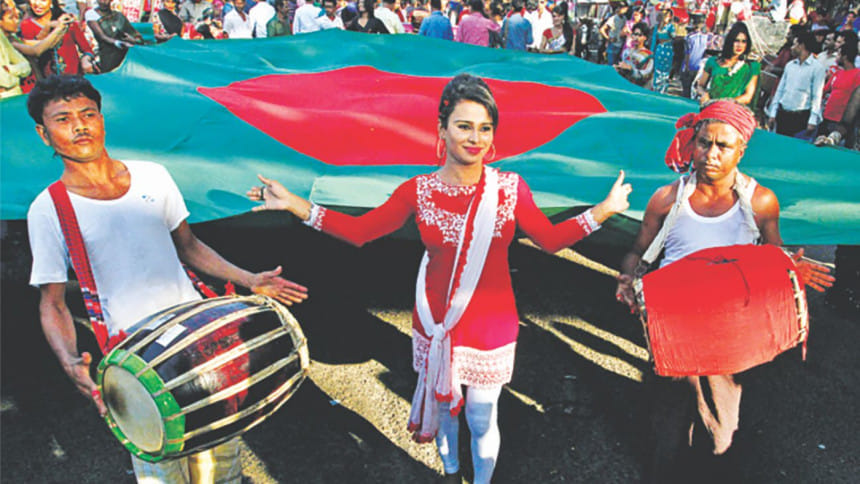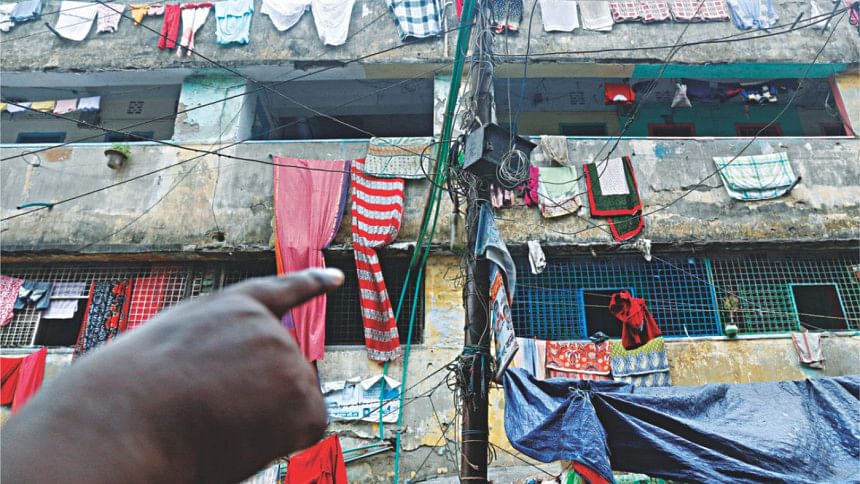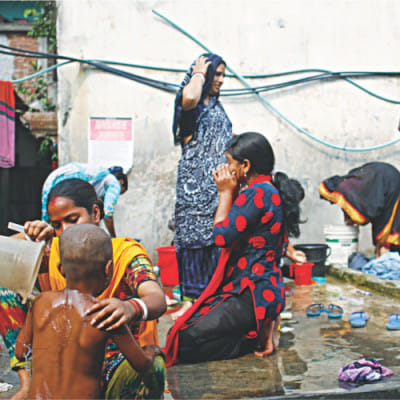How effective will the anti-discrimination law be?

Babu Rabi Dash is a jack-of-all-trades. He is a magician. He has an organisation that provides financial support to 60 students and he is also a well-known advocate in Joypurhat.
On the face of it, you would expect Babu to be leading a decent life. After all, it's not very often that one gets the liberty of wearing a black robe and dealing with criminals in the day, and turning into a magician by night. His connotation of the phrase "trick up his sleeve" literally has different meanings depending upon the time of the day.
However, the reality is that Babu still has to fight to earn his most basic rights. And that's because he is a Dalit. There have been times when he wasn't allowed to eat at the canteen of the Joypurhat Bar Association, the place where he works. There was also an occasion, two years ago, when he was forced to buy new plates and glasses for a restaurant in the Association's complex after he had a meal there with some of his friends from back home.
"My friends are Dalits as well. When some of the other lawyers came to know that we ate here, they forced the shopkeeper to pack all the utensils we touched and throw them away. I was later called and asked to pay for all of it," Babu says, while letting out a wry smile.
Following the incident, the advocate complained to the Bar Council and the issue was brought up at the Bar Council Tribunal. The restaurant owners were show-caused and Babu was given back his money.
The small victory helped Babu realise two things. The first is that when you have a tool at your disposal, and you know how to use it, you can overcome great struggles. However, he also realised that a majority of the people from his community cannot do so due to societal restrictions and lack of opportunities. That's why he desperately wants the government to pass the anti-discrimination law as soon as possible.
"I am someone who has a Master's degree from Rajshahi University. I am luckier than others in my community. But even I've had to face discrimination at various points. Just imagine the situation of those who aren't at a similar level. It is a lot worse for them," says Babu.
"Even today, in some places, when people from our community die, we aren't allowed to access the crematory. It just shows that thinking has not changed at all. Even a dead body is treated the same way. If this law is passed, then we at least have an instrument to protect ourselves," he adds.
The right to equality and the principle of non-discrimination is recognised by the constitution of Bangladesh. While article 27 of the constitution states that the people of Bangladesh are equal in the eyes of the law, article 28 forbids any discrimination on the basis of race, caste, religion, sex or place of birth.
Despite these constitutional assurances, social discrimination is quite widespread in Bangladesh.

Babu's example explains how Dalits are treated in the country. The case of hijras is not too different. According to Bandhu Social Welfare Society, an organisation that has been working for the betterment of the hijra community for two decades now, it receives 60-70 complaints of discrimination every month.
"This year we have already received 300 complaints of discrimination. Around 200 of them are family-related. For instance, some of them are not given their family property just because they are hijras. Some of them are forced to give all that they earn to their families. The other 100 complaints are against the police. Many members from the hijra community allege that the police regularly take money from them," explains Shajjed Ahmed, who is a country officer of Bandhu.
Considering the scenario, Bangladesh's Law Commission recommended that the government form an anti-discrimination law back in 2014 to address these issues in a more efficient and comprehensive manner. Many stakeholders, including the National Human Rights Commission (NHRC), were invited to give their opinion on what ought to be included in the law, and a draft was created.
According to Mohammad Golam Sarwar, Lecturer at the Department of Law in University of Dhaka, who was involved in the creation of the draft, the definition of the draft law is "wide and exhaustive."
"It includes discrimination against any individual and community. The grounds for discrimination, among others, include religion, faith, community, race, caste, custom, culture, occupation, ethnic originality, gender (including transgender), sexual orientation, disability, pregnancy, marital status, birth place, etc.
"A list of discriminatory acts is also provided in the law. Some of them include deprivation public services, creating obstacles in celebrating festivals of respective communities, prohibiting any individual or community to accept an occupation or conduct business and a lot more," explains Sarwar.
While bringing a number of discriminatory acts under one umbrella is no doubt a good step, many lawyers and members of civil society fear that that the law may not be implemented properly when it is passed.
When the law was initially drafted, the responsibility of the investigation of the cases was assigned to NHRC. In other words, under this system, if someone wanted to file a case under this law, they would have had to go to the NHRC instead of the police.
However, once the Law Commission forwarded the draft to the Law Ministry, the provision was revised. As per the current provision in the draft, a victim will have to go to the police or the Court of Magistrate to file a complaint. If the police refuse to take the case, only then can the victim go to the NHRC.
Dr Mizanur Rahman, former head of the NHRC, explains the problems with the current approach.
"When the responsibility was given to the NHRC initially, the Law Commission believed that the normal investigation procedure had its lapses and there was an impression of inadequacy. The chances of the victim actually benefitting from this law and fighting discrimination have been put into doubt by reverting back to the police or to the law enforcement agencies. This can turn out to be a weak legislation," argues Dr Rahman.
"Unfortunately the Law Ministry hasn't been able to come out of the box and find a new approach to fix the problem. Maybe this law can have a long term impact. Society might become more aware of the impacts of discrimination in the long term, which is positive. But we wanted to end discrimination immediately," he adds.

Another aspect that has been criticised is the amount of time that the Law Ministry is taking to begin the process of passing this law. The draft was first sent to the Law Ministry back in 2014. Three years on, the process of passing the law hasn't even begun. While the Law Minister, on a number of occasions, did publicly say that the law would soon be passed, it's still not certain when the process will begin.
"How can it take two to three years to scrutinise a law? I don't think any other law has taken so much time in Bangladesh. There are examples where laws have been made overnight. It does not seem as though they are interested passing this law," says Ahmed.
Dr Rahman echoes a similar sentiment. "This law should have been passed a long time ago. It is well known that the NHRC is not given any importance. But through this example, it has been proved again that the Law Commission is also not given any importance," he argues.
"The way this law has just been forgotten and kept aside, year after year, is frustrating. Our honourable Law Minister has not kept his word," he adds.
On May Day this year, the Thana Nirbahi Officer (TNO) of Khansama Bazar, decided to try and take a step to eliminate the stigma surrounding Dalits. He called a few boys from the Dalit community and invited them to eat at one of the many sweet shops at the bazar. The move initially seemed to be successful. For the next two days, many from the Dalit community were allowed to come into the shops and eat sweets. However, two days later, the owners of the sweet shops got together and called a strike. They also had political backing and as a result, the TNO was forced to drop the issue.
Incidents like these take place so frequently against marginalised communities that we have almost trained ourselves to turn a blind eye towards them. And that's probably what the authorities responsible for passing the anti-discrimination law have been doing as well. Why else would they take three years to formulate this law?
Follow Naimul Karim @naimonthefield

 For all latest news, follow The Daily Star's Google News channel.
For all latest news, follow The Daily Star's Google News channel. 



Comments